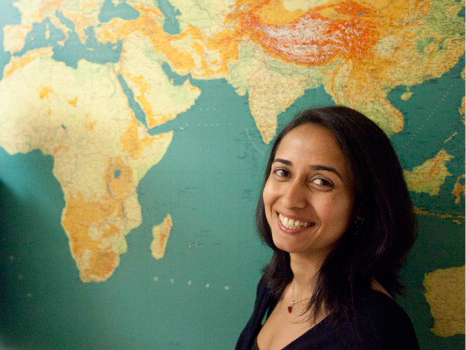Talk by molecular biologist and geneticist, Professor Priya Moorjani.
Talk Abstract
The study of genetic data combined with appropriate analytical tools can provide fine-grained resolution of evolutionary history that can complement evidence from archaeology and paleontology, in order to advance our understanding of human origins and disease. As illustration, I will describe how we can use genetic data from ancient and present-day South Asian populations to uncover population migration events impacting the Indian subcontinent in the past 10,000 years. These studies highlight that most contemporary Indian groups descent from a mixture of two highly divergent populations: Ancestral North Indians (ANI) related to Middle Easterners, Central Asians, and Europeans; and Ancestral South Indians (ASI) not closely related to groups outside the subcontinent. The mixture is pervasive and impacts nearly every group in India, including upper and lower caste traditional groups, as well as isolated tribal groups. Using a novel method that leverages genomic patterns of population mixture, we estimate that the ANI-ASI mixture occurred 1,900 to 4,200 years ago. In many upper caste and northern groups, we find evidence for multiple pulses of mixture. In a subset of isolated tribal groups, 100% of the mixture is consistent with having occurred during this period. These results demonstrate that India experienced a demographic and cultural transformation in the last few thousand years, changing from a region in which major population mixture was common to one in which mixture even between closely related groups became rare because of a shift to endogamy. Beyond the cultural importance, this transformation is also medically relevant as it has led to strong founder events in many Indian groups, more extreme than those in Ashkenazi Jews and Finns, both of which have high rates of recessive disease due to founder events. This highlights an under-appreciated opportunity for reducing disease burden in India, through the discovery and testing of recessive disease mutations.
Speaker Bio
Priya Moorjani is Assistant Professor in the Department of Molecular & Cell Biology at UC Berkeley. She is interested in using genetic data from present-day and ancient genomes to study human population history and evolution. Prof. Moorjani's lab focuses on using statistical and computational approaches to study questions in human genetics and evolutionary biology. A central aim in the lab is to understand the impact of evolutionary history on genetic variation and to apply this knowledge to understand human evolution, demographic history and disease. To this end, they use genetic data from ancient specimens and present-day individuals to learn about: (1) how different evolutionary processes such as mutation rate evolve across species, (2) when key events (such as introgression and adaptations) occurred in human history, and (3) how these patterns can be leveraged to identify genetic variants related to human adaptation and disease. The research in the lab involves both development of new methods and large-scale genomic data analysis.
Read more about Prof. Moorjani and her research at Moorjani Lab.
-------------------------
Event made possible with the support of the Sarah Kailath Chair of India Studies
Like us on FACEBOOK
Follow us on TWITTER
For DIRECTIONS to the Institute please enter "Institute for South Asia Studies" in your google maps or click this GOOGLE MAPS LINK.
PARKING INFORMATION
Please note that parking is not always easily available in Berkeley. Take public transportation if possible or arrive early to secure your spot.
The event is FREE and OPEN to the public.

